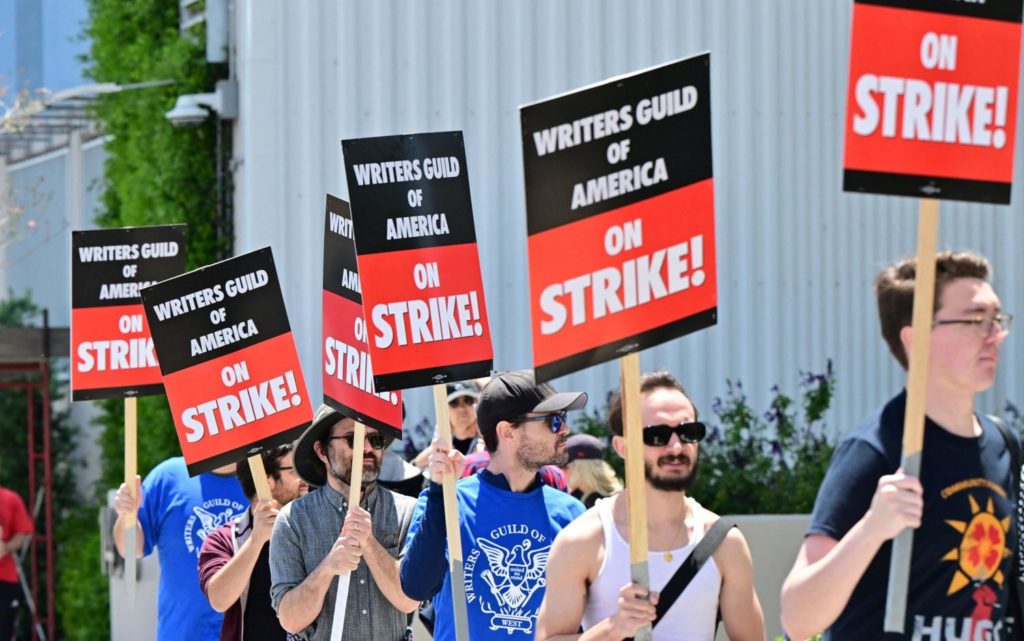On May 2nd, 2023, the Writers Guild of America (WGA), who spoke for over 11,500 Hollywood screenwriters, made the decision to go on strike after six weeks of failed negotiations with the Alliance of Motion Picture and Television Producers (AMPTP). This is the first Hollywood writers strike since 2008, and it follows six weeks of failed negotiations. The official statement from the WGA on the matter states that the companies in the AMPTP have “broken this business” and “taken so much from the very people, the writers, who have made them wealthy.” The writers stood in solidarity with all kinds of film workers, including directors, who avoided a strike after taking a deal of their own.
The WGA began the strike for a variety of reasons, with the recurring terms on the contract being related to payment and the use of artificial intelligence to replace workers. In a March 2023 update relating to the condition of the WGA, a worker detailed that studios have been using the transition from cable television to streaming-based television to start paying writers less than they are owed for their work. Working conditions were being worsened on all levels, and studios have writers working to the bone to complete season after season of television. The WGA report states that “while series budgets have soared over the past decade, median writer-producer pay has fallen.” Median writer-producer pay has declined 4% over the last decade (23% adjusted for inflation).
Residual payments are a crucial source of income for writers in the entertainment industry, ensuring that they continue to receive compensation for their creative work long after it has been initially produced and aired. These payments are particularly vital as writers rely on them to support themselves and their families, as well as to sustain their careers during lean times when they may not be actively working on new projects. However, a contentious issue has emerged with regard to these residual payments, particularly in the context of the AMPTP studios and their practices in the streaming era.
One of the primary grievances that has sparked concerns within the WGA is the perceived underpayment of writers for the reruns of their shows on streaming platforms. In the rapidly evolving landscape of entertainment distribution, streaming has become the dominant platform for viewership. Yet, writers argue that they are not being adequately compensated for the extended life and widespread availability of their work on these platforms. Instead of receiving fair and equitable payments that reflect the value of their content, many writers feel that they are being paid mere “pennies and dimes” for their contributions to these shows.
In an industry already grappling with the challenges of fair compensation for writers, the emergence of artificial intelligence as a potential replacement for human writers appears to add another layer of complexity to an already delicate situation. The concerns surrounding payment issues, often faced by writers who tirelessly craft compelling narratives and dialogue, seem exacerbated by the advent of AI-generated content. These advanced algorithms can generate text that is eerily similar to what a professional writer could produce in response to a given prompt, raising the specter of AI as a cost-effective solution for studios and production companies. The prospect of AI-generated scripts not only presents an attractive cost-saving opportunity for these entities but also raises questions about the future of creativity and human artistic expression in the entertainment industry. As technology continues to advance, the tension between the convenience and cost-effectiveness of AI and the unique creative insights of human writers becomes a pressing topic of discussion within the industry.
On September 24th, 2023, the WGA and AMPTP reached a tentative agreement on the matters, ending the strike. They agreed to minimum payments both parties deemed acceptable. Additionally, writers can elect to use AI while writing scripts, but a writer’s room may write over it at any time, and it is never a requirement or treated as literary material. As of October 4th, 2023, the current terms still stand.
You may also like:
-
Golden Globes 2024: Hollywood’s typical night of fun turned sour
-
Second Chapter: Gypsy Rose Blanchard navigates new life after prison
-
Executives transform stuffed animals with a plushy revolution
-
Man Attempts to Cross Atlantic Ocean in a Homemade Hamster Ball
-
The Paqui One Chip Challenge has returned with deadly results
